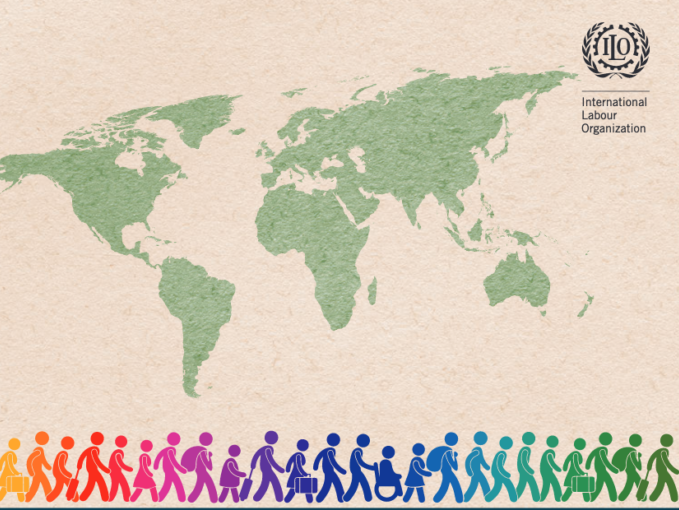All ILO Member States, even if they have not ratified the fundamental Conventions, have an obligation to respect, promote and realize the fundamental rights and principles.
30/11/2020

According to the ILO, there are around 11.5 million Migrant Domestic Workers (MDWs) globally. Majority are women from South East Asia and African countries pushed by limited economic opportunities and poverty to pursue employment outside of their country. Around 19% of Migrant Domestic workers live and work in the Arab states where there is a high demand for labour in the care sector. Over the last decade many Migrant Domestic Workers have shared accounts of various forms of abuse including physical, verbal and sexual have been reported, alongside living and working conditions amounting to human rights violations such as limited freedom of movement, denial of food and healthcare, non-payment of wages and long hours of work. In the Arab states, Kafala system and exclusion of MDWs from National labour laws leave them vulnerable to abuse and exploitation by their employers and recruitment agencies. So how does the International Labour standards framework protect MDWs?
International Labour Standards (ILS) are legal instruments which set out the basic principles and rights at work that frame the International Labour Organization’s (ILO) policy work and advice.
They serve the purpose of improving the living and working conditions of workers, consolidating social peace and equalizing conditions for international competition. International Labour Standards constitute of Conventions (currently at 190) which when ratified are legally binding, and Recommendations (206) which are not open to ratification but serve as technical guidelines. Conventions when not ratified represent objectives and influence national legislation.
Among the Conventions the ILO Governing Body has
identified eight fundamental Conventions, covering subjects that are considered to be fundamental principles and rights at work. These include:
- C87 Freedom of Association and Protection of the Right to Organise (1948)
- C98 Right to Organise and Collective Bargaining (1949)
- C29 Forced Labour (1930)
- C105 Abolition of Forced Labour (1957)
- C138 Minimum Age(1973)
- C182 Worst Forms of Child Labour (1999)
- C100 Equal Remuneration (1951)
- C111 Discrimination (Employment and Occupation 1958)
States that have not ratified one or more of the core Conventions are asked each year to report on the status of the relevant rights.
All ILO Member States, even if they have not ratified the fundamental Conventions, have an obligation to respect, promote and realize the fundamental rights and principles at work, because of their membership in the Organization. These rights are universal, and that they apply to all people in all States, regardless of the level of economic development. ILO member States that have not ratified one or more of the core Conventions are asked each year to report on the status of the relevant rights and principles, noting impediments to ratification, and areas where assistance may be required.
ILO standards on migrant workers
There are international labour standards that are specific to the rights of Migrant workers. These are especially crucial in cases where MDWs are excluded from the national labour laws and by extension from critical labour and social protections.
These include:
- C097 - Migration for Employment Convention (revised), 1949
- R086 - Migration for Employment Recommendation (revised), 1949
- C143 - Migrant Workers (Supplementary Provisions) Convention, 1975
- C151 - Migrant Workers Recommendation, 1975
ILO Conventions on migrant workers’ have two main Principles:
--> Equality of opportunity and treatment with respect to employment and occupation aims at ensuring equal access to employment, vocational training and education, job promotion and advancement, job security, and equal pay for work of equal value and conditions of work. Ensure that workers’ performance is rewarded according to productivity and merit, taking into account the objective characteristics of the job (e.g. skills, knowledge, responsibilities, working conditions), and without interference of considerations unrelated to merit (e.g. sex, race or religion).
--> Combating discrimination at work - including any distinction, exclusion or preference based on race, colour, sex, religion, political opinion, national extraction or social origin which has the effect of nullifying or impairing equality of opportunity or treatment in employment or occupation (for which there is no objective or legitimate justification).
Collective Action and Trade Unions
All the standards adopted by the ILO therefore apply
to migrant workers meaning that they have rights and freedom of association that is the right to form or join a trade union. Convention 98, together with Convention 87 on Freedom of Association and Protection of the Right to Organise, represents essential building blocks for a harmonious, stable and progressive industrial relation by empowering workers and employers to find solutions through voluntary negotiations.
Trade unions have the mandate to protect and fight for workers rights by organizing, representing and negotiating for better conditions of work and other workers interests. Some countries however, especially in the Middle East have limitations which
prevent the establishment and operation of legal trade unions therefore weakening the functioning of trade unions. Those that are formed are mostly guided by the state power and the rights
are rarely respected. In Lebanon for instance, Article 7 of the Labour Law excludes Migrant workers meaning that they’re explicitly prevented from joining or forming a trade union. When in 2015 Migrant domestic workers attempted to establish a Domestic Workers Union with the support of FENASOL (Federation of Trade Unions) and other NGOs, their efforts were quickly squashed and some of the activist workers deported. To protect MDWs from abuse and exploitation, Lebanon and other Migrant Labour receiving countries in the Middle East must include domestic workers in their labour laws and extend labour and social protections to them.
More stories

This Labour Day there is still a long way to go to protect Kenyan Migrant Workers abroad
Send Us Home Kenya


